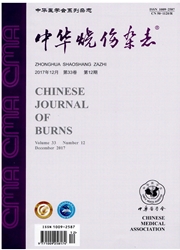

 中文摘要:
中文摘要:
目的 了解大面积烧伤脓毒症患者T淋巴细胞免疫功能的变化,探讨其与脓毒症的关系。方法 选择59例烧伤面积≥30%TBSA的患者,分为脓毒症组43例和非脓毒症组16例。采集两组患者伤后1、3、5、7、14、21、28d的外周静脉血,检测T淋巴细胞增殖能力和白细胞介素2(IL-2)的分泌水平,并行相关性分析;通过流式细胞仪检测CD3^+/CD4^+ T淋巴细胞的百分率及其凋亡率,并行相关性分析。结果 与非脓毒症组比较,脓毒症组患者伤后l、14、2l、28dT淋巴细胞增殖能力和IL-2的分泌水平均显著下降(P〈0.05或P〈0.01),两指标呈显著正相关(r=0.82,P〈0.01)。伤后1、5、14、21、28d,脓毒症组患者CD3^+/CD4^+T淋巴细胞百分率明显低于非脓毒症组,而其凋亡率呈相反趋势(P〈0.05或P〈0.01),两指标呈显著负相关(r=-0.66,P〈0.05)。结论 大面积烧伤脓毒症患者T淋巴细胞免疫功能持续处于抑制状态,T淋巴细胞凋亡参与了脓毒症细胞免疫紊乱的病理生理过程。
 英文摘要:
英文摘要:
Objective To observe the immunological function changes in T lymphocyte in severe burn patients with sepsis, and to explore its relationship with sepsis. Methods Fifty-nine burn patients with burn surface exceeding 30% TBSA were enrolled in the study, and they were divided into sepsis group (S, n =43) and non-sepsis group (NS,n = 16). The peripheral venous blood samples of the patients in both groups were collected on 1, 3, 5, 7, 14, 21 and 28 post-burn days ( PBD). The T lymphocyte proliferation ability and the interleukin-2 (IL-2) level in both groups were observed and the correlation between them were analyzed. The percentage of CD3^+/ CD4^+ T lymphocytes and its apoptosis rate were determined by flow cytometry and the correlation between them was analyzed. Results Compared with that in NS group, the proliferation ability of T lymphocyte and the level of IL-2 were significantly decreased in patients in S group on 1, 14, 21, and 28 PBD( P 〈 0.05 or P 〈 0.01 ). The inhibition of T lymphocyte proliferation was positively correlated to the low level of IL-2 production in burn patients ( r = 0.82, P 〈 0.01 ). The percentage of CD3^+/CD4 ^+ T lymphocytes in S group were obviously lower than that in NS group on 1, 5, 14, 21, 28 PBD, whereas on opposite tendency in the apoptosis rate of CD3^+ CD4^+ T lymphocytes were found at the same time ( P 〈 0.05 or P 〈 0.01 ). The percentage of CD3^+/CD4^+ T lymphocytes was negatively correlated to apoptosis rate of T lymphocytes ( r = - 0.66, P 〈 0.05 ). Conclusion The immunological function of T lymphocyte in severely bum patients with sepsis is depressed persistently. Apoptosis of T lymphocyte may participate in the pathological process of cell immunological disorder induced by sepsis.
 同期刊论文项目
同期刊论文项目
 同项目期刊论文
同项目期刊论文
 期刊信息
期刊信息
